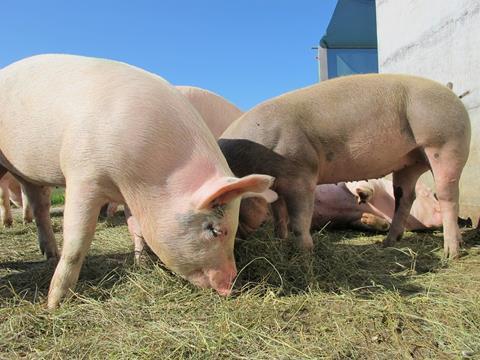Valuable work around improving pig health and welfare in the UK has been highlighted in a new report launched at the Great Yorkshire Show.

The new PHWC biennial report was unveiled by Dr Jane Downes MRCVS, chair of the Pig Health and Welfare Council (PHWC).
At the event, Dr Downes also set out the strategy for developing the new 20:30 vision for pig health and welfare.
The biennial report (2017-2018) details the PHWC’s achievements from the past two years and highlights priorities for the coming year. It is also an excellent reference document on the current shape and size of the pig industry.
During the past two years, the council has taken a new approach to managing projects, holding workshops and developing smaller, manageable programmes of work.
One such workshop resulted in Exercise Trent, a disease simulation exercise held to test the contingency plan for dealing with an outbreak of Porcine Epidemic Diarrhoea virus (PEDv). The exercise was implemented primarily by the Agriculture and Horticulture Development Board (AHDB), with support from the Animal and Plant Health Agency (APHA), and proved to be an extremely useful exercise.
Other programmes of work have focused on topics such as African swine fever, LA-MRSA and hepatitis E, and the council has also had a wider involvement in the tail-biting action group and Defra’s revised code of practice for pig welfare.
Dr Downes emphasised that without healthy pigs and safe pork products, we have no commodity to trade.
Another industry achievement that the PHWC has contributed to, and highlighted in the new report, is the considerable advances in reducing antibiotic usage in pigs. The group continues to support the industry to reduce antibiotic use again to 110 mg/PCU in 2018. This represents a further 16% reduction on 2017 figures and edges closer to the 2020 industry target of 99 mg/PCU.
To achieve their vision of securing a safe, sustainable and profitable industry, PHWC has identified six themes, which the wider industry is being consulted to ensure the council can be confident they have identified the correct route.
These themes are:
- Partnership working with those in the pig industry and other farm animal sectors
- Maintain and extend disease surveillance
- Reduce, control or eliminate endemic disease, including those with food safety implications, with the aim of reducing the need for the use of antibiotics
- Use of data and new technologies
- Provide evidence that all production systems provide for physical and mental wellbeing
- Promote professional skills
Dr Downes said: “In future, we will need to think about the bigger picture in any recommendations for change, the impact on the environment, air quality, water quality and waste management and, to this end, we will be inviting such experts to join the PHWC.”
In her concluding remarks, Dr Downes said: “The council recognises that many of the challenges faced by the industry in 2017 and 2018 will continue to be of importance in 2019 and 2020, including the threat of disease, welfare issues, zoonotic diseases and antibiotic resistance.
“We will be working with the pig industry to update the 20:20 vision to take the industry forward to 2030. We aim to secure a sustainable and profitable industry which has the ability to invest in new technologies, disease-control measures and high welfare standards in all production systems, meeting the requirements of both present customers and new markets.”
Dr Downes thanked all those who have given their time to contribute to the PHWC, and said: “The support from across the chain demonstrates that the PHWC’s contribution to health and welfare is acknowledge and appreciated by those in industry and those in government.”
This story was originally published on a previous version of the Meat Management website and so there may be some missing images and formatting issues.















